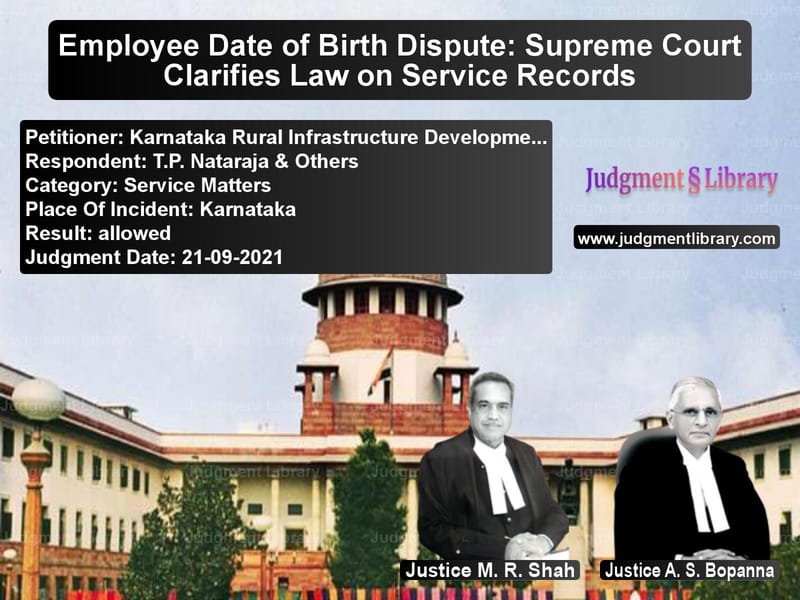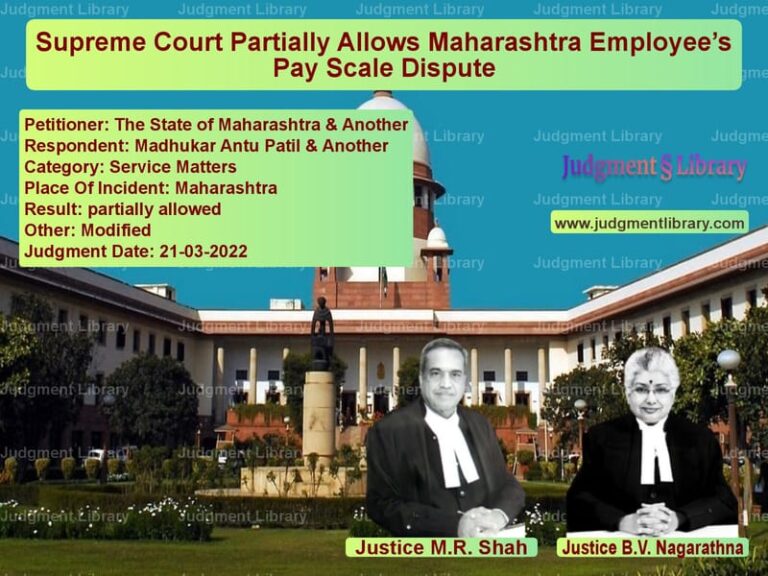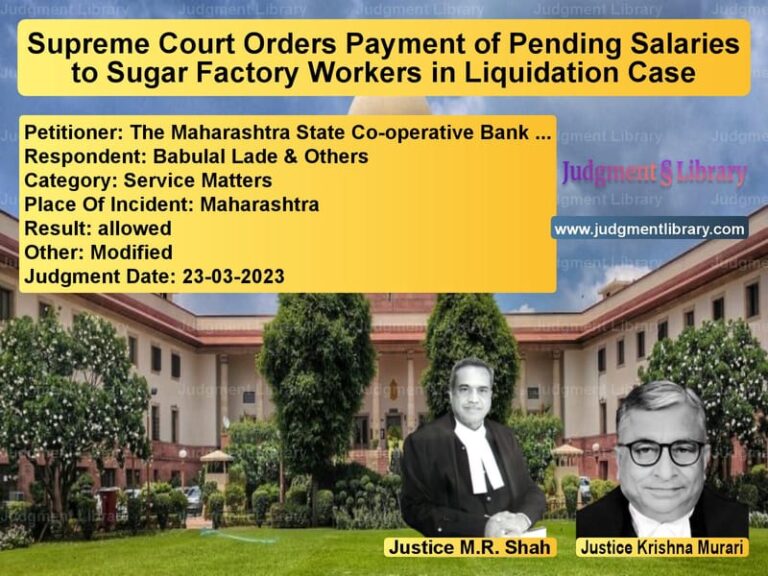Employee Date of Birth Dispute: Supreme Court Clarifies Law on Service Records
The case of Karnataka Rural Infrastructure Development Limited v. T.P. Nataraja & Others revolved around the dispute regarding an employee’s request to change his date of birth in service records after 24 years of employment. The Supreme Court of India had to decide whether such a change could be allowed and the legal principles governing such cases.
The case involved two appeals concerning employees of the Karnataka Rural Infrastructure Development Limited (KRIDL) who sought to change their date of birth in service records. The main contention was whether such requests were permissible after a long delay and whether courts had the jurisdiction to entertain such claims.
Background of the Case
The primary appellant, Karnataka Rural Infrastructure Development Limited (KRIDL), challenged the Karnataka High Court’s judgment, which had allowed the change in date of birth in favor of an employee, T.P. Nataraja. The employee initially had his date of birth recorded as January 4, 1960, based on his SSLC marks card. However, after 24 years of service, he sought to change it to January 24, 1961.
The trial court had rejected the employee’s request, citing statutory provisions that prohibit changes in date of birth after a certain period. However, the High Court overturned this decision, reasoning that the employee might not have been aware of the applicable rules, thereby allowing the change in birth date.
Legal Provisions Involved
The case primarily involved the interpretation of the Karnataka State Servant (Determination of Age) Act, 1974. Key provisions of the Act are:
- Section 4: Prohibits alteration of age or date of birth of a state servant, except as per the provisions of the Act.
- Section 5(2): Specifies that no alteration to the date of birth for an employee’s advantage shall be made unless they apply for the change within three years from the date of joining service or within one year of the enactment of the law.
- Section 6: Bars courts from adjudicating disputes regarding the determination of age of state servants, emphasizing that decisions under the Act cannot be questioned in any court.
Petitioner’s Arguments
The appellant, KRIDL, argued that:
- The employee had requested a change in his date of birth after 24 years, which violated the statutory limitation period.
- The Karnataka Civil Service Rules and allied laws, which KRIDL adopted in 1991, mandated that date of birth changes be requested within three years of employment.
- Ignorance of the law was not a valid excuse, and employees were expected to be aware of the applicable rules.
- The delay in requesting the change demonstrated a lack of diligence, and entertaining such requests would set a negative precedent.
Respondent’s Arguments
The employee, represented by legal counsel, argued that:
- The employee was not aware of the limitation period under the Karnataka State Servant (Determination of Age) Act, 1974.
- The organization had not informed him about the resolution adopting the Act in 1991.
- Since the High Court had already ruled in his favor and the judgment had been implemented, the Supreme Court need not interfere.
- The change in date of birth was necessary to correct an error and ensure fairness.
Supreme Court’s Observations
The Supreme Court analyzed the relevant provisions of the Karnataka State Servant (Determination of Age) Act, 1974, and past judicial precedents. The Court observed:
- Legal Limitation: The statutory limitation of three years for requesting a change in date of birth was clear, and the employee had failed to comply with it.
- Ignorance of Law: The Court rejected the argument that the employee was unaware of the applicable rules, stating that being a government employee, he was expected to know the regulations.
- Judicial Precedents: The Court referred to past rulings, including:
- Home Deptt. v. R. Kirubakaran (1994): Held that correcting the date of birth at the fag end of service has a chain reaction, affecting promotions of other employees.
- State of M.P. v. Premlal Shrivas (2011): Stated that courts should be cautious while ordering changes to service records, particularly at the end of an employee’s career.
- Bharat Coking Coal Ltd. v. Shyam Kishore Singh (2020): Affirmed that such corrections cannot be claimed as a matter of right and should be rejected if made after a long delay.
Supreme Court’s Judgment
The Supreme Court ruled in favor of KRIDL, holding that:
- The request for changing the date of birth was time-barred and could not be entertained.
- High Court’s decision allowing the correction was erroneous and against the statutory provisions.
- The Karnataka State Servant (Determination of Age) Act, 1974, clearly prohibited such changes beyond the prescribed time limit.
- Allowing such corrections after 24 years of service would set a bad precedent and disrupt the system.
However, the Court noted that since the High Court’s order had already been implemented and the employee had retired based on the revised date of birth, its ruling would not affect him personally. Instead, the judgment was meant to clarify the legal principles for future cases.
Key Takeaways from the Judgment
- Employees must request changes in their date of birth within the prescribed time limits.
- Ignorance of the law is not a valid excuse for delay.
- Courts should not interfere in date of birth disputes at the end of an employee’s career.
- Changing service records after a long delay can disrupt the promotional hierarchy of other employees.
- The Karnataka State Servant (Determination of Age) Act, 1974, bars courts from adjudicating such disputes.
Conclusion
The Supreme Court’s ruling in this case reaffirms the importance of adhering to statutory limitations in service record disputes. It ensures that changes in an employee’s date of birth are not made arbitrarily and that government service regulations are followed strictly. By ruling against retrospective changes after a long delay, the Court has upheld the principles of administrative efficiency and fairness in government employment.
Petitioner Name: Karnataka Rural Infrastructure Development Limited.Respondent Name: T.P. Nataraja & Others.Judgment By: Justice M. R. Shah, Justice A. S. Bopanna.Place Of Incident: Karnataka.Judgment Date: 21-09-2021.
Don’t miss out on the full details! Download the complete judgment in PDF format below and gain valuable insights instantly!
Download Judgment: karnataka-rural-infr-vs-t.p.-nataraja-&-othe-supreme-court-of-india-judgment-dated-21-09-2021.pdf
Directly Download Judgment: Directly download this Judgment
See all petitions in Employment Disputes
See all petitions in Public Sector Employees
See all petitions in Disciplinary Proceedings
See all petitions in Judgment by Mukeshkumar Rasikbhai Shah
See all petitions in Judgment by A. S. Bopanna
See all petitions in allowed
See all petitions in supreme court of India judgments September 2021
See all petitions in 2021 judgments
See all posts in Service Matters Category
See all allowed petitions in Service Matters Category
See all Dismissed petitions in Service Matters Category
See all partially allowed petitions in Service Matters Category







